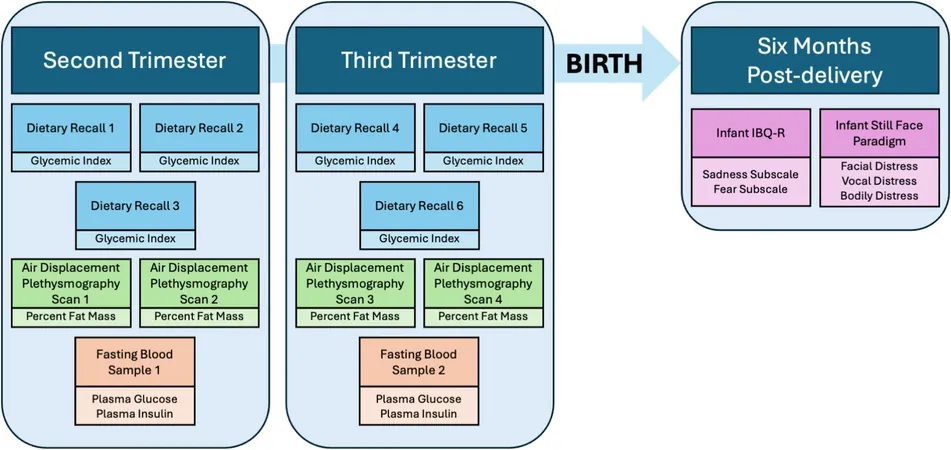
Shocking New Study Reveals How Maternal Diet Shapes Your Baby's Mental Health!
2025-03-26
Author: Jia
Groundbreaking Study from OHSU
A groundbreaking study from the Oregon Health & Science University (OHSU) shines a critical light on the profound impact of maternal diet during pregnancy, revealing a startling connection between what mothers consume and the behavioral health of their infants. Conducted at the OHSU's Center for Mental Health Innovation, this research emphasizes the crucial role of nutrition, particularly in the third trimester, in determining the mental health trajectory of children.
Key Findings
Published in *Scientific Reports*, the study evaluated the dietary habits of expectant mothers during their second and third trimesters and revealed that high-glycemic index foods—those that trigger dramatic spikes in blood sugar—are linked to adverse behavioral outcomes in infants. Foods like sugary cereals, white bread, and snack chips can negatively influence a child's temperament and emotional regulation, elements directly associated with mental health disorders.
Expert Insights
Lead author Dr. Elizabeth Wood, an assistant professor of psychiatry, stated, “These findings highlight significant opportunities to enhance nutrition during pregnancy. By targeting specific dietary needs at critical timepoints, we can make a remarkable difference in infant behavioral health.” This call to action underscores a pressing need for policies that ensure expectant mothers have access to healthy foods, education, and resources to make informed dietary choices.
Research Methodology
The research involved over 300 participants who detailed their dietary intake and provided blood samples throughout their pregnancies. This extensive data collection allowed researchers to formulate a precise nutritional profile for each mother, with a particular focus on glycemic index levels. Interestingly, when children reached six months of age, caregivers reported their infants' behaviors, and laboratory assessments revealed a troubling correlation: higher maternal glycemic index intake in the third trimester was associated with increased risks of mental health issues in infants.
Importance of the Third Trimester
Dr. Jamie Lo, a maternal-fetal medicine specialist at OHSU, emphasized the third trimester as a critical window for dietary quality. “While nutrition is vital throughout pregnancy, our findings suggest that the third trimester is especially important for influencing a child's health outcomes. Health care providers have a unique opportunity to advocate for dietary improvements at this stage, potentially altering the mental health landscape for future generations.”
Support for Expecting Mothers
In an effort to support healthy nutrition during pregnancy, the OHSU Center for Women's Health has established the My Pregnancy Plate model— a guide that encourages a balanced, varied, and moderate approach to dietary choices. Moreover, personalized nutritional counseling with registered dietitians is available for expecting mothers, ensuring they receive adequate support tailored to their unique needs.
Future Directions
As this research progresses, the team aims to uncover the optimal diet for pregnant women, enhance access to nutritious foods, and develop effective nutritional interventions that could significantly impact the health of mothers and their children. “Intervening during pregnancy provides invaluable knowledge and tools, not just for the woman, but for the next generation,” says Dr. Elinor Sullivan, who continues to lead this vital research. “Together, we are shaping the health of the future.”
Conclusion
Stay tuned for more insights on how to safeguard your baby’s mental health even before their arrival!





 Brasil (PT)
Brasil (PT)
 Canada (EN)
Canada (EN)
 Chile (ES)
Chile (ES)
 Česko (CS)
Česko (CS)
 대한민국 (KO)
대한민국 (KO)
 España (ES)
España (ES)
 France (FR)
France (FR)
 Hong Kong (EN)
Hong Kong (EN)
 Italia (IT)
Italia (IT)
 日本 (JA)
日本 (JA)
 Magyarország (HU)
Magyarország (HU)
 Norge (NO)
Norge (NO)
 Polska (PL)
Polska (PL)
 Schweiz (DE)
Schweiz (DE)
 Singapore (EN)
Singapore (EN)
 Sverige (SV)
Sverige (SV)
 Suomi (FI)
Suomi (FI)
 Türkiye (TR)
Türkiye (TR)
 الإمارات العربية المتحدة (AR)
الإمارات العربية المتحدة (AR)